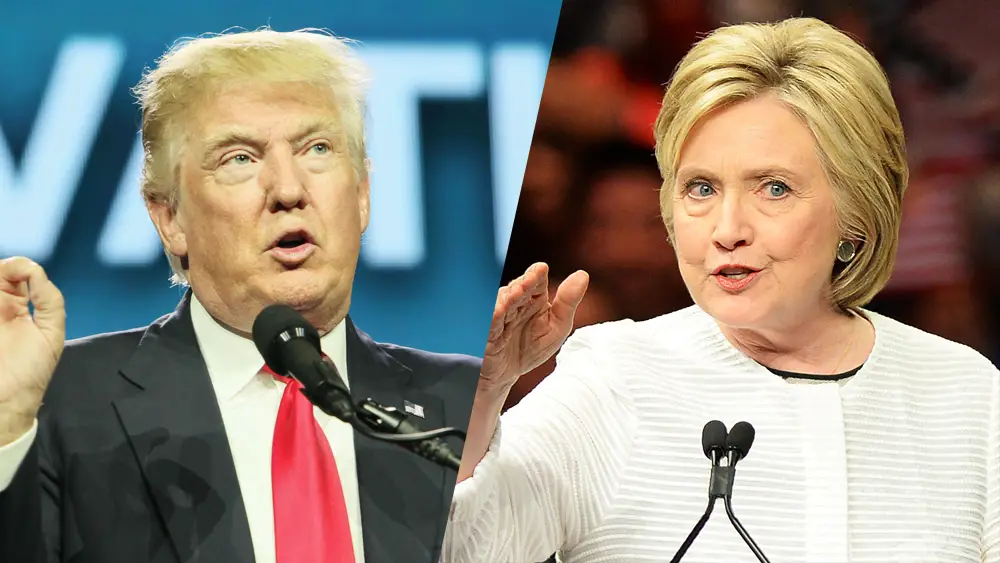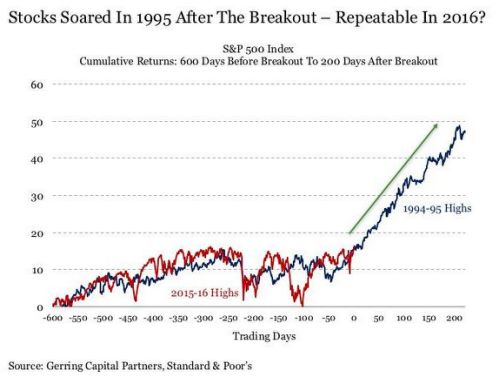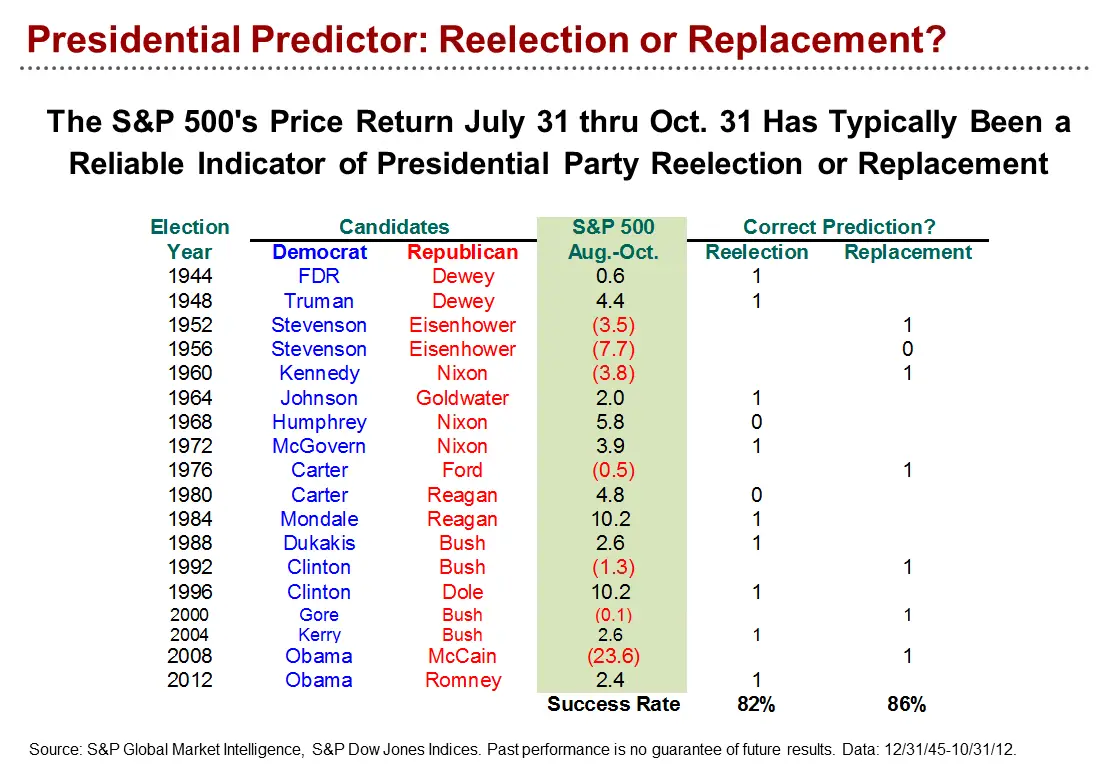The polls have been up and down this year, so it’s been hard to figure out who would win. Part of the problem is that both candidates are the least popular in history. That means party loyalty may not be as important as hostility toward the individual candidate. That also means that Hillary Clinton’s inherited Electoral College advantage may not help her.
For example, despite her small poll advantage (RealClearPolitics give her a 3.9% national lead) many technical factors point to a Trump win.
Allan Lichtman says he can predict the outcome of any U.S. presidential election. He often does it months or even years ahead of time. Oh, and his predictions have been right in every presidential election since 1984.
But Lichtman, a distinguished professor of history at American University, doesn’t use polling, demographics or sophisticated analysis of swing states. He makes his predictions based on 13 true/false statements that he says indicate whether the incumbent party will retain the White House or lose it in a given election.
Lichtman and Russian scientist Volodia Keilis-Borok came up with the keys — a series of true/false statements — in the early 1980s. The idea is that if more than half of the keys are true, the incumbent party will stay in power, and if more than half are false, the challenging party will win the White House.
The keys, which are explained in depth in Lichtman’s book “Predicting the Next President: The Keys to the White House 2016” are:
1. Party Mandate: After the midterm elections, the incumbent party holds more seats in the U.S. House of Representatives than after the previous midterm elections.
2. Contest: There is no serious contest for the incumbent party nomination.
3. Incumbency: The incumbent party candidate is the sitting president.
4. Third party: There is no significant third party or independent campaign.
5. Short-term economy: The economy is not in recession during the election campaign.
6. Long-term economy: Real per-capita economic growth during the term equals or exceeds mean growth during the previous two terms.
7. Policy change: The incumbent administration effects major changes in national policy.
8. Social unrest: There is no sustained social unrest during the term.
9. Scandal: The incumbent administration is untainted by major scandal.
10. Foreign/military failure: The incumbent administration suffers no major failure in foreign or military affairs.
11. Foreign/military success: The incumbent administration achieves a major success in foreign or military affairs.
12. Incumbent charisma: The incumbent party candidate is charismatic or a national hero.
13. Challenger charisma: The challenging party candidate is not charismatic or a national hero.
Lichtman’s logic is that elections are not about individuals, or even parties, but rather, public satisfaction with the “incumbent” party.
We reconceptualized presidential elections, not as Carter vs. Reagan, Republicans vs. Democrats, liberals vs. conservatives, but as “party holding the White House” vs. the challenging party. Now, in earthquake prediction, they predict by looking at factors in the physical environment associated with stability and upheaval. So we chose to look at factors in the political environment associated with stability — the party holding the White House stays in power — and earthquakes — the party holding the White House is thrown out.
And I had a theory behind this. This did come from my studying of presidential elections. And my theory was that the pundits and the scholars are all wrong about predicting presidential elections. That the real key is not the candidates, or the issues, or the debates, or the ads, but rather the performance of the party holding the White House — that essentially, American voters are ultimately pragmatic. And if the party holding the White House did a good job, they’d give them four more years. If not, they’d toss them out.
So, what did the professor say about this year?
Right now the Democrats are clearly down four keys: The mandate key, which is based on midterm elections — they got shellacked in 2014. The sitting president key. Obviously Obama isn’t running again. The policy change key, which only applies to the second term, and there’s been no significant, lasting policy changes in the second term. And the incumbent charisma key. Whatever you may think of Hillary Clinton, she’s no John F. Kennedy or Franklin Roosevelt.
That means this election will be decided by the two keys hanging fire: The contest key, No. 2, and the foreign policy success key, No. 11. It will not be decided by the debates, the speeches, the ads, the tricks of the campaign.
Everyone seems to agree that this is a year in which most people want “change.” That’s why Lichtman has said Trump is likely to win. Another voice says that the stock market is also calling a Trump win.
My job is to interpret what I see in the stock market and the market is forecasting a Donald Trump victory. That is one of the reasons why the market has been strong and will continue to be strong. . .
1) Trump will win Ohio, Florida and Pennsylvania and it’s game over! My reasoning is the INCREDIBLE number of people who are quietly supporting Trump but can’t voice their opinion. . .
2) The stock market started a new bull market in July of 2016. The technicals are incredibly strong and the sentiment forecast is partly miserable with a chance of a crash. The thought of a 1994-95 repeat scenario for the markets (see chart) BLOWS people’s minds away. . . .My theory is that it’s forecasting a Trump win, a more business friendly environment, and a stronger economy over the next few years.
Meanwhile, Bloomberg News says the Standard & Poor’s Average also predicts a Trump win.
The performance of Standard & Poor’s 500-stock index from July 31 to Oct. 31 has a curious way of predicting the winner of the presidential election. . . the pattern is solid, as shown in this chart by Sam Stovall, equity strategist for S&P Global Market Intelligence.
Should the S&P 500 record a positive return from July 31 to October 31, it signals the reelection of the party in power, while a decline suggests replacement. The S&P ended September slightly below its July close, so the election results are at the mercy of the market’s October performance.
There were a couple of times the S&P predictor failed, but then, that seems to reinforce Lichtman’s theory above.
Two times the pattern didn’t hold were in 1968 and 1980, when influential third-party candidates were in race, including George Wallace, who took about 14 percent of the popular vote in ’68. The pattern also failed in 1956, which Stovall says could be attributed to geopolitical events putting the markets on edge. That was the year of the Suez Crisis and the Hungarian Uprising, he noted.
Trump “bullishness” is not limited to the academic and business fields. This year, liberals are also forecasting doom for the liberal candidate. Cenk Uygur, host of online site, “Young Turks,” for example.
Cenk Uygur, host of ‘The Young Turks’ predicts that Donald Trump will win an electoral victory in November. . . I’ve got Trump at 279-259… I gave him Florida, Ohio. . .he’s a populist candidate when the country’s angry and you run and it’s the most establishment candidate we’ve ever seen against him. It was a terrible idea by the Democrats to support Hillary Clinton. . .
I’m very worried — and if the Democrats are not really, really worried that, in this populist time Donald Trump doesn’t have an excellent chance to win, they’re completely wrong.
In fact, even Michael Moore (liberal film maker, including Fahrenheit 9/11) says Trump will win, according to Breitbart.
Sunday on NBC’s “Meet The Press,” while discussing the popularity of Republican presidential nominee Donald Trump liberal filmmaker Michael Moore said angry voters “see Donald Trump as their human Molotov cocktail, that they get to go into the voting booth on November 8th and throw him into a political system.”
Moore said, “Yes, which I don’t want him to win. Let’s make that clear. I’ve been trying to say for months here, I live in Michigan. Across the Midwest, across the rust belt, I understand why a lot of people are angry. They see Donald Trump as their human Molotov cocktail, that they get to go into the voting booth on November 8th and throw him into a political system that has made their lives miserable miserable.”
In fact, Moore’s own website offers five reasons why he thinks Trump will win.
1. Midwest Math, or Welcome to Our Rust Belt Brexit. I believe Trump is going to focus much of his attention on the four blue states in the rustbelt of the upper Great Lakes – Michigan, Ohio, Pennsylvania and Wisconsin. Four traditionally Democratic states – but each of them have elected a Republican governor since 2010. . .Trump is ahead of Hillary in the latest polls in Pennsylvania and tied with her in Ohio. Tied? How can the race be this close after everything Trump has said and done?
2. The Last Stand of the Angry White Man. Our male-dominated, 240-year run of the USA is coming to an end. A woman is about to take over! How did this happen?! On our watch!. . .That’s a small peek into the mind of the Endangered White Male. . .This monster, the “Feminazi,” the thing that as Trump says, “bleeds through her eyes or wherever she bleeds,” has conquered us — and now, after having had to endure eight years of a black man telling us what to do, we’re supposed to just sit back and take eight years of a woman bossing us around?
3. The Hillary Problem. Can we speak honestly, just among ourselves? And before we do, let me state, I actually like Hillary – a lot – and I think she has been given a bad rap she doesn’t deserve. But her vote for the Iraq War made me promise her that I would never vote for her again. . . Let’s face it: Our biggest problem here isn’t Trump – it’s Hillary. She is hugely unpopular — nearly 70% of all voters think she is untrustworthy and dishonest. She represents the old way of politics, not really believing in anything other than what can get you elected.
4. The Depressed Sanders Vote. Stop fretting about Bernie’s supporters not voting for Clinton – we’re voting for Clinton! The polls already show that more Sanders voters will vote for Hillary this year than the number of Hillary primary voters in ’08 who then voted for Obama. This is not the problem. . . “depressed vote” – meaning the voter doesn’t bring five people to vote with her. He doesn’t volunteer 10 hours in the month leading up to the election. She never talks in an excited voice when asked why she’s voting for Hillary. A depressed voter.
5. The Jesse Ventura Effect. Finally, do not discount the electorate’s ability to be mischievous or underestimate how any millions fancy themselves as closet anarchists once they draw the curtain and are all alone in the voting booth. . .There are no rules. And because of that, and the anger that so many have toward a broken political system, millions are going to vote for Trump not because they agree with him, not because they like his bigotry or ego, but just because they can.
Donate Now to Support Election Central
- Help defend independent journalism
- Directly support this website and our efforts


